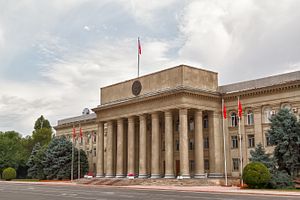In three days, Kyrgyzstan will hold a key vote to elect the entirety of its parliament. Last elected in 2010, months after revolution upset the nation and unseated then-President Kurmanbek Bakiyev, the Kyrgyz parliament is a centerpiece of Kyrgyzstan’s democracy–arguably the closest to functional in the region. Still, some have grave concerns for the state of Kyrgyz democracy and worry about both the process, as well as the outcome, of the election.
As I noted in an earlier piece, Kyrgyzstan’s plethora of parties lack real platforms. According to the OSCE, Kyrgyzstan has 203 registered political parties–although only 14 parties met the registration requirements to get on the ballot. The 14 parties that are vying for seats include a number of odd marriages–prompted by the rules of the game.
The 120-member parliament will be elected via a proportional representation system, using party-lists that have been registered with the election authorities. This means Kyrgyz voters cast their ballots for a party. The individuals who actually enter parliament depends on how many seats the party wins and where an individual sits on the list. The lists themselves are subject to a number of regulations-related to gender, ethnicity, youth, and disability. Then, in order to win a seat, a party needs to win at least 7 percent of the vote nationwide and at least 0.7 percent of the votes in each of Kyrgyzstan’s 7 regions, plus its two largest cities–Bishkek and Osh.
The OSCE refers to this as a “dual threshold” and notes in its interim report on the upcoming election that it has been previously criticized. On the surface, the intention is legitimate–that political parties be concerned with the interests of the whole nation. But there are a few problems with this mandate. Many political issues are local or regional–as with elections around the world people are concerned about jobs in their town, electricity for their house, schools for their children. But in order to be competitive parties have merged in odd ways–not consolidating around policy positions or constituent’s interests but instead adding members for maximum geographic reach.
As Nate Schenkkan points out in a recent piece on Foreign Policy, “The party lists look as if someone wrote down the names of the country’s top politicians, put them in a hat, and shook them up.”:
The most traditionally pro-Russian party has somehow added the country’s two most pro-American legislators. Respublika, led by a baby-faced former prime minister from the north who lost his premiership over allegedly accepting a horse as a bribe, has created a joint list with a party tied to the former Bakiyev regime. That party’s leader is an ex-boxer from the south who was thrown in jail in 2012 after he tried to lead a mob to storm the parliament building. This week the Central Election Commission disqualified him from running after another candidate claimed he punched him.
The result of this is the reinforcement of a class of political elites. Although party lists, by law, have to include 15 percent individuals under 35 and 15 percent national minorities–these candidates may never take a seat in the parliament. There are regulations stipulating that one out of each group of four candidates must be from the minority gender (generally women)–there are no placement requirements for youth or minorities. Though the maximum number of seats any one party can earn is 65, no party is expected to get that close–even the Social Democratic Party (SDPK), the president’s party, only had 26 seats in the last parliament. (Technically, President Almazbek Atambayev left the SDPK when assuming his post, per Kyrgyz law, but as Bruce Pannier notes, “many still look at the SDPK as Atambaev’s party”). The SDPK is expected to do well–in part because of the perception that it is the president’s party–but analysts expect 5 or 6 parties to make it into parliament. Then the coalition building will begin, and surely there will be more odd political marriages.

































